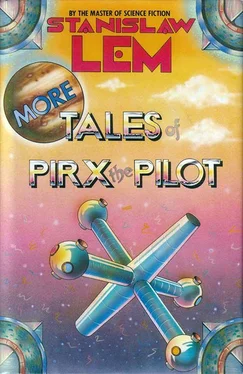Pirx lay back, his eyes glued to the ceiling. He could imagine Cornelius at Syntronics effortlessly. What was his job? He ran the load-test simulators. In other words, he put the computers through their paces, something that came naturally to him. The man probably lived in constant dread of being taken for a madman, which he wasn’t. He never panicked in a real crisis. He was brave, but his bravery was gradually eroded by his obsessions. Torn between his crew and his own twisted insides, he must have felt caught between the hammer and the anvil. He looked like a sufferer, not because he surrendered to his obsessions, not because he was deranged, but because he resisted them, constantly seeking pretexts, a means of justification. He needed those regulations; he used them to vindicate himself, to show it was not his fault, that he was not to blame for that eternal drilling. He wasn’t a sergeant at heart; otherwise, he would not have read Poe’s eerie, macabre stories. Was he searching for his own private hell in those tales? What must it be like to harbor a tangle of barbed wire, to be always on the defensive, ready to suppress, time and again … and underneath it all, the terror of the unpredictable, of that something against which he had always to be on guard. Hence the drilling and the exercising, the test alerts, the inspections, the musters, the surveillance, the all-night prowling fore and aft—good God, he knew how they all laughed on the sly, possibly even saw himself how senseless it was. Was he now taking it out on those computers? If so, then unconsciously. A case of transference. He excused himself on the grounds of necessity.
How uncanny the degree to which another language, that of medical science, could throw what was previously known, personally and second-hand, into a new perspective. With the master key of psychiatry, Pirx was able to plumb the depths, to have a man’s personality laid bare, distilled, reduced to a handful of reflexes, as pitiful as they were inescapable. To be a doctor accustomed to viewing people as case studies, even for the sake of helping them, struck him as unspeakably obscene. And yet only now did the thin aura of buffoonery edging the memory of Cornelius begin to dissolve. In this new and unexpected version there was no room for that maliciously schoolboyish, shipboard, barracks kind of humor. There was nothing funny about Cornelius.
One would have thought his post at Syntronics the right job for the right man: a chance to prod, pressure, and challenge to the utmost of endurance, a place to vent all his frustrations. To the uninitiated, it must have seemed a perfect marriage. An old pro, an ex-rocket jockey, transmitting all he knew to the computers—what could be more ideal? He, on the other hand, was freed from all restraints: he was dealing with slaves, not people. A computer fresh off the assembly line was like a newborn babe: full of potential, but helpless.
Learning requires the ability to filter the relevant from an undifferentiated mass. At the test bench, the computer plays the part of the brain, whereas the simulator imitates the body. The brain fed by the body: an apt analogy.
Just as the brain oversees the state of every muscle, a computer monitors a ship’s systems. It transmits a barrage of questions to all parts of the ship, and the computer, that metal colossus, translates the responses into a visual display. Intruding on the infallible was a man debilitated by a fear of the unknown and combatting it with his obsessive rituals. The simulator became a tool of his compulsiveness, the embodiment of his anxieties. Cornelius was governed by the law of maximum safety. How laudable! How hard he must have tried! A routine flow was quickly judged to be substandard. And the greater the challenge, the faster the feedback.
Cornelius must have decided that the retrieval speed of the sub-routines had to be correlated with the importance of the procedure. And since the landing maneuver was the most critical… Did he reprogram it? It was just like someone who spends hours inspecting his car motor and ends up trying to rewrite the operator’s manual. The program couldn’t disobey him. He was pushing into areas where the program was defenseless. Whenever an overloaded computer broke down, Cornelius sent it back to the engineering department. Did he realize that he was infecting them with his obsessions? Probably not. He was a man of practice, not theory—a perfectionist, whether in regard to machines or men. He overloaded his computers, but, then, his computers were hardly able to protest. The latest models were designed to operate like chess players and were programmed to beat any operator, provided their trainer wasn’t a Cornelius. They could anticipate two or three moves in advance, but they overloaded when the number of variables increased exponentially. In the case of ten consecutive chess moves, a trillion operations would not have sufficed. In a tournament, a player handicapped by such self-paralysis would be disqualified in the first round. Aboard ship, it took longer: a computer’s input/output can be monitored, but not its insides. Inside, a massive traffic jam; outside, a routine procedure. For a while, anyway.
Such was the brain, so overburdened with spurious tasks as to be rendered incapable of dealing with real ones, that stood at the helm of a hundred-thousand-tonner. Each of Cornelius’s computers was afflicted with the “anankastic syndrome”: a compulsion to repeat, to complicate simple tasks; a formality of gestures, a pattern of ritualized behavior. They simulated not the anxiety, of course, but its systemic reactions. Paradoxically, the fact that they were new, advanced models, equipped with a greater memory, facilitated their undoing: they could continue to function, even with their circuits overloaded.
Still, something in the Agathodaemon’s zenith must have precipitated the end—the approach of a strong head wind, perhaps, calling for instantaneous reactions, with the computer mired in its own avalanche, lacking any overriding function. It had ceased to be a real-time computer; it could no longer model real events; it could only founder in a sea of illusions… When it found itself confronted by a huge mass, a planetary shield, its program refused to let it abort the procedure, which, at the same time, it could no longer continue. So it interpreted the planet as a meteorite on a collision course, this being the last gate, the only possibility acceptable to the program. Since it couldn’t communicate that to the cockpit—it wasn’t a reasoning human being, after all—it went on computing, calculating to the bitter end: a collision meant a 100 percent chance of annihilation, an escape maneuver, a 90-95 percent chance, so it chose the latter: emergency thrust!
It all made sense. Logical—but without the slightest shred of evidence. It was something unprecedented. How could he confirm his suspicions? The psychiatrist who had treated Cornelius, helped him, given him job clearance? The Hippocratic oath would seal his lips, and the seal of secrecy could be broken only by a court order. Meanwhile, six days from now, the Ares …
That left Cornelius himself. Was he aware by now? After all that had happened, did he suspect anything, have any inkling? There was no second-guessing the veteran commander. He was untouchable, as if insulated by a glass wall. Even if gnawed by doubts, he would not admit to them. He would suppress them, that was clear enough.
But it was bound to come out anyway, after the next shipwreck. Assuming the Anabis soft-landed, a routine statistical analysis would point the finger of suspicion at Cornelius’s computers. Every component would be microscopically analyzed, every clue traced…
But Pirx couldn’t just sit around and twiddle his thumbs. What to do? He knew: erase the Ares’s memory, transmit the original program, and the computer would be reprogrammed in a matter of hours.
Читать дальше












